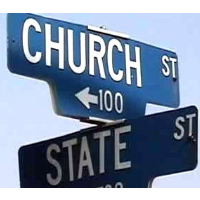Jesus Gets a Shout-Out from U.S. Appeals Court after Lancaster City Prayers Are Challenged

Although most prayers offered at the start of Lancaster City Council meetings are Christian and usually invoke Jesus Christ by name, they do not violate the U.S. Constitution’s guarantee of separation between church and state.
That ruling last week by the U.S. Court of Appeals for the Ninth Circuit Court is in conflict with rulings in two other appellate courts and sets up a potential showdown in the U.S. Supreme Court. The Second and Fourth circuit courts, with decisions that affect many states on the East Coast, have each banned legislative-prayer practices that mention Jesus by name (when done on a regular basis).
The Lancaster prayer in question was delivered in 2010 by Bishop Henry Hearns, the city’s former mayor, and stated: “Bring our minds to know you and in the precious, holy and righteous and matchless name of Jesus I pray this prayer.”
Shelley Rubin and Maureen Feller, two attendees, were offended by the prayer and sued. The city had recently ditched an official Christian prayer that was read before every meeting, which had been challenged by the American Civil Liberties Union as too sectarian a practice. Lancaster then substituted revolving prayers mostly from different Christian groups that by and large presented the same message.
The lawsuit was filed one month after city voters approved a ballot measure legalizing religious invocations by clergy before city council meetings. Rubin, who is Jewish and does not live in Lancaster, is the widow of Irv Rubin, who in 2002 successfully challenged in state courts the city of Burbank’s sectarian prayer at the beginning of its city council meetings. Feller is Christian and lives in the city.
The U.S. District Court ruled decided that Lancaster’s new open prayer policy established that it wasn’t proselytizing and ruled for the city. On appeal, the Ninth Circuit court acknowledged that 20 of the 26 prayers offered before city council meetings since Lancaster passed its new law were delivered by Christian preachers and mentioned Jesus by name, but said that didn’t mean the “city itself has taken steps to affiliate itself with Christianity.”
All three appellate courts cite the Supreme Court’s Marsh v. Chambers ruling in 1983 that frowned on sectarian references in legislative prayers, but the three-judge panel in the Ninth Circuit court said the other two courts were wrong to measure that violation by how often Jesus was mentioned in prayers. The court reasoned that because most of the religious organizations in the area were Christian, it was reasonable that those chosen by the city to deliver the opening invocation would mention Jesus by name.
Lawyers for the plaintiffs indicated they would appeal the court’s decision.
–Ken Broder
To Learn More:
CA City Council Prayers Didn't Endorse Jesus (by Tim Hull, Courthouse News Service)
City Wins, Prayers Continue at Council Meetings (by Fran Paolinelli, Antelope Valley News)
Lancaster City Council Prayers Again Ruled Constitutional (by Cindy Chang, Los Angeles Times)
Invoking Jesus Christ Banned in Certain City Councils (California City News)
Shelley Rubin and Maureen I. Feller v. City of Lancaster (U.S. Court of Appeals Ninth Circuit Court) (pdf)
- Top Stories
- Controversies
- Where is the Money Going?
- California and the Nation
- Appointments and Resignations
- Unusual News
- Latest News
- California Forbids U.S. Immigration Agents from Pretending to be Police
- California Lawmakers Urged to Strip “Self-Dealing” Tax Board of Its Duties
- Big Oil’s Grip on California
- Santa Cruz Police See Homeland Security Betrayal in Use of Gang Roundup as Cover for Immigration Raid
- Oil Companies Face Deadline to Stop Polluting California Groundwater





